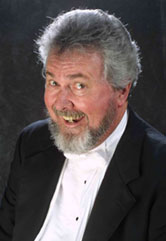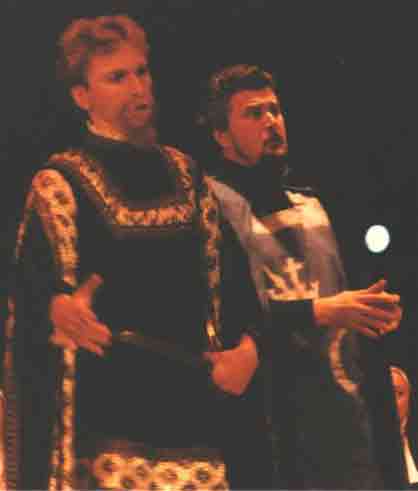Voice Type - Bob is a bass-baritone with a large, smooth,

dark
voice. The decision about what part is appropriate for the voice is
not the entire vocal range, per se, but the tessitura, the range within which most of the music lies, and how well the voice has aged. So in some works he sings bass and in others baritone.
For example, in Mozart’s Magic Flute he has sung Papageno (baritone) but nowadays The Speaker (bass) or the Second Armored Man (bass) are more appropriate; alas, he would never attempt the basso profundo (deep, dark bass) role of Sarastro, whose lowest notes must be clearly heard in the “cheap seats.” In Mozart’s Marriage of Figaro he has sung the basso buffo (comic bass) role of Dr. Bartolo, but not the same character in Rossini’s Barber of Seville, because that role includes extremely fast passages that he finds extremely difficult to sing. He can, however, do the basso cantante role of Don Basilio in that opera because it calls for a smooth, dark voice.
 Bob’s age has now become a consideration in Mozart’s Don Giovanni. Although there are four roles for baritones or basses, he’s no longer young enough to do the title role or the youthful Massetto. Instead, he can be the Don’s middle-aged manservant Leporello (basso buffo) or the Commendatore (basso profundo).
Bob’s age has now become a consideration in Mozart’s Don Giovanni. Although there are four roles for baritones or basses, he’s no longer young enough to do the title role or the youthful Massetto. Instead, he can be the Don’s middle-aged manservant Leporello (basso buffo) or the Commendatore (basso profundo).
In Verdi’s Otello, he can sing the sleazy Iago (a specialty known as a “Verdi baritone”) or Lodovico (bass). But if he’s doing Don Carlos, he’s either King Phillip or the Monk (both basses), but not Rodrigo (Verdi baritone) or the Grand Inquisitor (basso profundo). If he’s singing music from a Wagnerian opera, Bob’s likely to opt for a Heldenbariton (heroic baritone) role such as the Dutchman in Der fliegende Holländer, Hans Sachs in Die Meistersinger von Nürnberg, or Wotan in Das Rheingold or Die Walküre. Despite his imposing physical presence, there’s no way Bob could sing Wagnerian bass roles like Hagen or the giants Fafnir or Fasolt, which call for true basso profundo voices!
Operatic Roles - Fluent in German, Bob sings phonetically in Italian, French, Spanish, Russian, and Hebrew. (He’s also been knownto sing in English!)
- Principal: Colline in Puccini’s La Bohème

Papageno in Mozart’s Die Zauberflöte
Ferrando Verdi’s Il Trovatore
Friar Tuck in DeKoven’s Robin Hood
Dr. Bartolo in Mozart’s Le Nozze di Figaro
(Italian and English)
Wurm in Verdi’s Luisa Miller
Raimondo in Donizetti’s Lucia di
Lammermoor
Baldassare in Donizetti’s La Favorita
Sulpizio in Donizetti’s The Daughter of
the Regiment
Der Lautsprecher IN Ullmann’s Der Kaiser
von Atlantis.
- Secondo: Mandarin in Puccini’s TurandotMonk in Verdi’s Don Carlos.
- Comprimario: Rochefort in Donizetti’s Anna Bolena
Alessio in Bellini’s La Sonnambula
Dr. Grenville in Verdi’s La Traviata
Bonze in Puccini’s Madama Butterfly.
Bob also sings in the professionalchorus of the Opera Company of North Carolina.
 Musicals/Operettas - Recently, Bob returned to the world of Broadway musicals after a long
hiatus, playing and dancing the role of the Governor in The Best Little Whorehouse in Texas. He has also performed the role of Beauregard in Mame.
Bob prefers Broadway musical roles written for trained operatic voices, such as Emile de Becque in South Pacific (created for Ezio Pinza) or Don Quixote in The Man of La Mancha. On the lighter side, he has performed Baron Mirko Zeta in Lehár’s The Merry Widow, the Grand Inquisitor in Gilbert & Sullivan’s The Gondoliers. and Frank in Johann Strauss Jr’s Die Fledermaus.
Musicals/Operettas - Recently, Bob returned to the world of Broadway musicals after a long
hiatus, playing and dancing the role of the Governor in The Best Little Whorehouse in Texas. He has also performed the role of Beauregard in Mame.
Bob prefers Broadway musical roles written for trained operatic voices, such as Emile de Becque in South Pacific (created for Ezio Pinza) or Don Quixote in The Man of La Mancha. On the lighter side, he has performed Baron Mirko Zeta in Lehár’s The Merry Widow, the Grand Inquisitor in Gilbert & Sullivan’s The Gondoliers. and Frank in Johann Strauss Jr’s Die Fledermaus.
Art Songs - Bob also enjoys singing art songs, particularly the German Lieder cycles of Beethoven (An die ferne Geliebte), Schubert (Winterreise), Brahms (Vier ernste Gesänge), Schumann (Dichterliebe), Mahler (Kindertotenlieder), and others. Among his favorite English-language song cycles are Vaughan Williams’s Songs ofTravel and Copland’s Old American Songs.
Church Soloist - When singing in churches or synagogues, Bob prefersthetraditiona l classical repertoire to the pop-oriented songs nowprevalent in many houses of worship. Give him Bach, Handel, Beethoven, Mozart, or Verdi to sing, and he will tremendously enhance a service. His church repertoire includes spirituals and anthems appropriate for an operatic voice.
l classical repertoire to the pop-oriented songs nowprevalent in many houses of worship. Give him Bach, Handel, Beethoven, Mozart, or Verdi to sing, and he will tremendously enhance a service. His church repertoire includes spirituals and anthems appropriate for an operatic voice.
Other Religious Services - Bob also sings at weddings, Bar/Bat Mitzvahs, funerals and other religious services. If you’re a choirmaster planning to do Brahms’ Ein deutsches Requiem
(A German Requiem) and need a terrific baritone soloist, give Bob a call!
 Other Venues - Bob has also sung in a variety of other situations, including family reunions. _____
Other Venues - Bob has also sung in a variety of other situations, including family reunions. _____